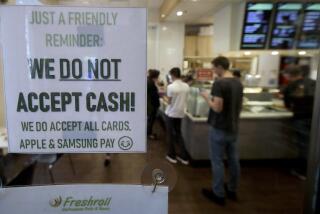The Lowdown on Layaway, Credit Card and Check Transactions
- Share via
Putting merchandise on layaway can be a convenient way to buy when your credit is running low or you don’t have credit.
* When you enter into a layaway agreement, the seller agrees to put your purchase aside and keep it for you until you have paid in full.
* You and the seller must agree on the price, amount of deposit, amount of each payment and the length of time the merchandise will be kept for you.
* To protect consumers from unfair layaway policies, the state of California passed the Layaway Practices Act. Here is what the law says: “Any seller who enters into a layaway agreement with a customer must give the customer the following information in writing.
1. The amount of down payment received from the customer.
2. The length of time the goods will be held on layaway.
3. A description of the goods that are being held.
4. The total purchase price of the goods, including a separate listing of any special costs.
5. Any other terms and conditions of the layaway agreement.
6. The conditions of the seller’s refund policy.
Businesses don’t have to accept checks and credit cards, but those that do must follow the rules listed below.
* Businesses that accept payment by credit card cannot write, or require you to write, your address, telephone number or other personal identification information on the credit card transaction form. Also, businesses cannot use credit card forms that have printed spaces for a telephone number, address or other personal information.
* The law does not prohibit a business from asking to see identification, such as a driver’s license or identification card, when accepting payment by credit card, as long as the information is not recorded on the credit card slip or elsewhere.
* Businesses that accept payment by check cannot require that you have a credit card, cannot write your credit card account number on the check or elsewhere, and cannot require you to sign a statement that would allow the business to charge your credit card if the check is no good.
* A business can record a credit card number if it gives you cash in the same amount as your check, or if a credit card number is accepted as a deposit instead of cash or a check.
* A business is also allowed to record a credit card number on a check that is used to make a payment on a credit card account.
Source: Los Angeles County Department of Consumer Affairs
More to Read
Inside the business of entertainment
The Wide Shot brings you news, analysis and insights on everything from streaming wars to production — and what it all means for the future.
You may occasionally receive promotional content from the Los Angeles Times.









